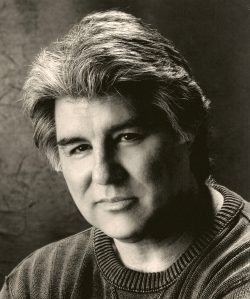
Ten Questions With Jim Weatherly
September 28 2008
Nashville Songwriters Hall of Fame Member, Jim Weatherly, shares entertaining stories about songwriting, inspiration behind his hits, and being in the right place at the right time.
Jim Weatherly is best known for his million-selling hit songs by Gladys Knight and the Pips including "Midnight Train to Georgia," "Neither One of Us, and "The Best Thing That Ever Happpened to Me," all three of which have become pop and R&B standards. In addition to recording seven albums himself, he's also had his songs recorded by Vince Gill, Steve Wariner, Dan Seals, Marie Osmond, Bill Anderson, Charley Pride, Eddy Arnold, Dean Martin, Johnny Mathis, Peter Cetera, The Indigo Girls, Jeff Carson, Lee Greenwood and Kenny Rogers, just to name a few.
Mr Weatherly has been honored by the Nashville Songwriters Association International as Songwriter of the Year and has won more than 30 ASCAP songwriter awards. He was inducted into the Nashville Songwriters Hall of Fame in 2006. Today Jim continues to write and record songs and currently sells his albums on Web site, and at CD Baby and Amazon.com.
Q: What does it mean to you to be a member of the Songwriter's Hall of Fame?Jim Weatherly: It definitely raises your self-esteem as a writer, it truly does. When you're selected by your contemporaries to be among the elite of your peers, it's a very, very special thing. It means they accept you and what you do, and that what you have done is relevant in the history of music. There's just no greater honor, no greater thrill.
Q: How did you get your first song recorded?
JW: My very first cut happened when I was in college. I was in a band called "Jimmy Weatherly and the Vegas." We recorded some songs that were released on 20th Century Fox Records. My first cut recorded by another artist happened when I was walking the streets of L.A., pitching songs, trying to find somebody to cut something. There were a couple of producers looking for some funky R&B music. It was the late 60's. I pitched them a song called "Mama Your Daddy's Come Home." They cut it using a singer named "Magnificent Maluchie." I think my next cut was by Peggy Lee. She was doing an album, and I had a song called "He Used Me." She fell in love with it, and she cut it in on one of her albums. After that, I actually wrote for Jim Nabors' publishing company for about two years. That was when he had a variety TV show. As I remember, he cut three of my songs: "If I Never Laugh Again," "It's My Life," and "Louisiana Lady."
Q: How did all the hits with Gladys Knight come together?
JW: I went to L.A. after college in 1966. I moved there with a rock 'n roll band called Gordian Knight, who I played with for about four years. We did one album for Verve.
After the band split up, I met Jim Nabors through Lee Majors, whom I had become friends with. Lee introduced me to Jim, and Jim asked if I wanted to start writing songs. I said "Sure." What else was I going to do besides walk the streets and park cars? When Jim's variety show ended, we parted ways. At that point, I was just walking the streets trying to find someone who liked what I did. That was when I met Gary Usher. He was one of the original surfers and he wrote a lot of songs with Brian Wilson. He wrote for Jan & Dean and The Handels. I asked Gary to listen to some of my songs, and he was very gracious about it. He introduced me to Larry Gordon, who became my publisher and manager. Larry was a really fine publisher, a one-man operation. Basically, it was his company, and he didn't have to answer to anybody. He went out and got songs cut and that's how all those songs came about.
That's also how Gladys Knight came around. He knew Joe Porter, who was producing Gladys for Motown. Joe really liked a song I wrote called "Neither One of Us." I had cut it on my first album, and Joe heard it and wanted Gladys to record it. I never really imagined writing R&B songs. I really thought I was writing country songs. But they heard something in my songs—looking back it was probably the way they had a lot of space between lyrics. I didn't try to fill up everything with words or move everything close together. The songs would breathe, so you were almost waiting for what the next line was, as opposed to the line hitting before you were ready to hear it. So Gladys cut that song, and it actually became a #1 record. You'll read everywhere that it was a #2 pop record, but now that I have the opportunity to set the record straight, I'm going to! The song was "Neither one of Us," and it was #2 pop record on Billboard and #1 in Cashbox and Record World, which were both industry standards at that time. It was also a #1 R&B record as well.
The story behind "Midnight Plane to Houston," which was the original title of "Midnight Train to Georgia" is pretty well documented, but pretty interesting as well. I was playing on a flag football team with some guys in LA. Lee Majors was on the team. Lee had just started dating Farrah Fawcett, and when I called up to his house one day, Farrah answered the phone. During the course of the conversation, Farrah said she was packing her clothes—she was taking the midnight plane to Houston to visit her folks. When she said it, my mind really went away from the conversation. When I got off the phone, I sat down and wrote "Midnight Plane to Houston" in just a little more than 30 minutes. It just literally fell out. My mind was using Lee and Farrah as the people in the song, so it was like I could see the visuals. I didn't know where it was going, because back then I didn't know how to craft a song, I was just writing because it was a natural part of me. When I got to the line in the chorus "leaving on a midnight plane to Houston, going back to a simpler place in time, I'll be with her on the midnight plane to Houston, I'd rather live in her world then live without her in mine" it really wrapped it up in a nice package. After I wrote it, I cut it on my first album.
We also sent Gladys "Midnight Plane to Houston," but before she ever did it, I got a call from a producer in Georgia named Sunny Limbs. He wanted to cut the song with Cissy Houston but needed a more R&B title in order to get it played on black radio. So we changed the title to "Midnight Train to Georgia." It was a mid-chart R&B record at that time.
After Cissy's version came out, we sent the song to Gladys again. She told us that the Pips were from Georgia, so when they heard that version, it was a natural for them. She felt more at home with it at that time and went in and cut it. I was absolutely amazed when I heard it. I always thought it was the kind of song Glenn Campbell might cut because he was having success with "Galveston," "By The Time I Get To Phoenix," and "Wichita Line." But when I heard "Midnight Train to Georgia" the way Gladys's did it, with all the background parts, I felt blessed! That's the only way I can put it. And I never dreamed it would still have a life after 35 years. They have used it on American Idol the last four years straight. In the finale, they had an old video of Gladys' performance and had taken out the Pips. Instead they had Ben Stiller, Robert Downey Jr., and Jack Black. They were doing all the Pips movement behind her, and it was hilarious! They released it to download on itunes for a week, and it became the #1 download. So I feel very fortunate that I have had some songs with Gladys that have stayed around a long, long time.
Q: Where does the inspiration come for your songs?
GW: In the early days, I wrote just by a stream of consciousness. I would just pick up a guitar and start playing. Just playing some chords and mumbling would transform into words and a melody and a song would start to take shape. For instance, when I wrote "Neither One of Us," I was really in a blue funk. I came in one night, sat down on the bed and picked up my guitar. I sang the first verse to the song, and I didn't have a lyric or a title, I didn't have any of that. The mood that I was in totally inspired the emotion, and the emotion came out in music. The whole first verse just fell right out. When I got to the last line of the verse and said "Neither one of us wants to be the first to say goodbye," I knew I had a song. I knew that it was a really fine song. So many people I had been playing my songs for at the time would say to me "You write such sad songs. Why don't you write some up tempo songs? Why don't you write positive songs? Why don't you do anything that is different then what you are?" So when I wrote this song, when I finished "Neither One of Us," I closed my book and I thought, "Well, there is another sad song nobody will ever want to hear." I'm really glad I was wrong about that one, and I'll bet so was everybody else who turned it down.
Q: What's one lesson you've learned about songwriting that you can pass on to future songwriters?
JW: There are no rules, but there are rules. Music changes, so the rules today might not apply tomorrow. The kind of music you write today might not apply tomorrow. Sometimes the music you write today might be ahead of its time and won't be ready to be heard until tomorrow. So I just write what I believe is honest and true and good, and let it fall where it falls. I never attempt to write a hit song. I just write songs that come to me. When I attempt to write a hit song it really doesn't come out quite as true, quite as honest to me. I think for the most part people pick up on that. When I hear music with a false sincerity, I don't believe the song or the artist. The songs I fall in love with as writer and listener of music are songs where I believe what that artist is saying. Even if the story is make believe, it can have a semblance of universal truth so that people can relate.
Q: Are there any songs that you wish you had written?
JW: I feel I have written some songs that are very special, but there are some songs that others have written that I absolutely love. One of my early favorites was "Unchained Melody." That song has come back time and time again. So there was obviously something in that song that touched people. "The Twelfth of Never" is a song you don't hear much of today. Another song I really love is "I Can't Make You Love Me," the Alan Shamblain and Mike Reid song. I once told Alan that if there was ever a song I wish I had written, it was that song.
I'm also a big Jimmy Webb fan. I got to meet him when he was 18 and writing for Johnny Rivers Publishing Company in L.A. I was pitching some songs to Johnny Rivers and remember one night Johnny invited me to his house. It was just me, Johnny, and Jimmy Webb. I hadn't had a cut yet, and Johnny hadn't signed me as a writer, but he was giving me a lot of good advice. That night Jimmy sat at the piano and played "Didn't We" and a song called "Sidewalk Song" and "Galveston." All I was thinking was "Oh my goodness, I have never heard music like this before." His music took a great melody and a realistic lyric and put them together, as opposed to writing music with really fluffy lyrics. Jimmy put honest lyrics to his music. That's why I have always been a great fan of his.
Q: Where were you when you first heard your first song on the radio?
JW: The first song I ever heard of mine on the radio was one I recorded off my first album. It was called "Loving You is Just an Old Habit." It was a single released on RCA Records. I was driving on the Ventura Freeway in L.A., west to go to Brentwood down the 405, when the song came on the radio. I said "Oh my goodness!" When I looked up I was way past Encino somewhere. I had gone so far past my turn off, I had no idea where I was.
Q: Given everything it has taken to be a successful songwriter, would you do it all over again?
JW: Yes. But here is the thing about that kind of question. I was really naïve when I became a songwriter. Actually I didn't plan on becoming a songwriter. I was just having fun in a rock group and fell into it. I had saved $7,000. I decided when that was gone I was going back to college. All I lacked was my practice teaching. I was going to get my degree and coach football. I had $3000 left when I met Gary Usher and all that kind of turned around.
I never really had a plan. I have been very fortunate to have just stumbled upon certain things—being at the right place at the right time. Although I thought they were the wrong songs, because so many people would reject them, turn them down. I know every writer in the world has this experience. Everyone turns your songs down, before eventually, you write something that lands somewhere. I started writing at the age of 13, so I had spent a lot of years trying to write songs with nothing happening. I was in my late 20's when I finally had success at it. It seems that's songwriting is in you. It's what I was supposed to do. I simply believe that! So, that's what I have kept doing.
Q: What advice do you have for up and coming songwriters?
JW: There is no right or wrong way to do it. Everybody has to find their own way. And today it is much harder. When I started out, people weren't expecting to hear demos sounding like records. People weren't expecting to hear good guitar vocals. They were just expecting to hear something that moved them. Back then people could hear a song's potential even with bad guitar and vocal demos. If I presented that kind of demo today, I don't think I would get any response at all. People are now so used to hearing demos that sound finished, they either don't consider that the song itself would make a great record, or they don't understand that it would. About the only way you don't need a professional demo is if you're lucky enough to run into a Tim McGraw or Kenny Chesney on the street and become buddies. Then you can say "Kenny can I play you a song?" and he lets you play it, and he likes it. That's like the Dean Dillon and George Strait thing. Dean Dillon can play George a song on the guitar and George will cut it. It's a rarity nowadays for that to happen for new songwriters. The hard thing is that it costs you $1,000 to cut a demo of one song. It's a hard question to answer. All I know is if it's in your heart and soul to be a songwriter, just find away—find a way.
For more on Jim Weatherly visit his Web site at http://www.jimweatherly.com/.


